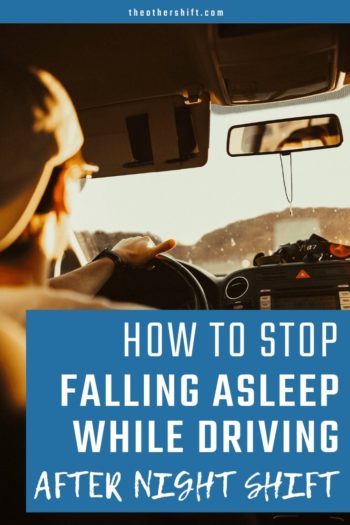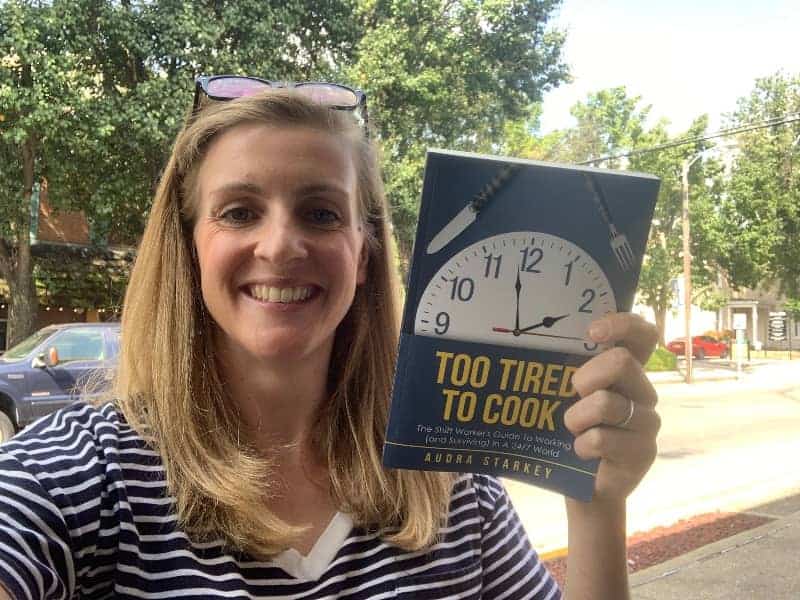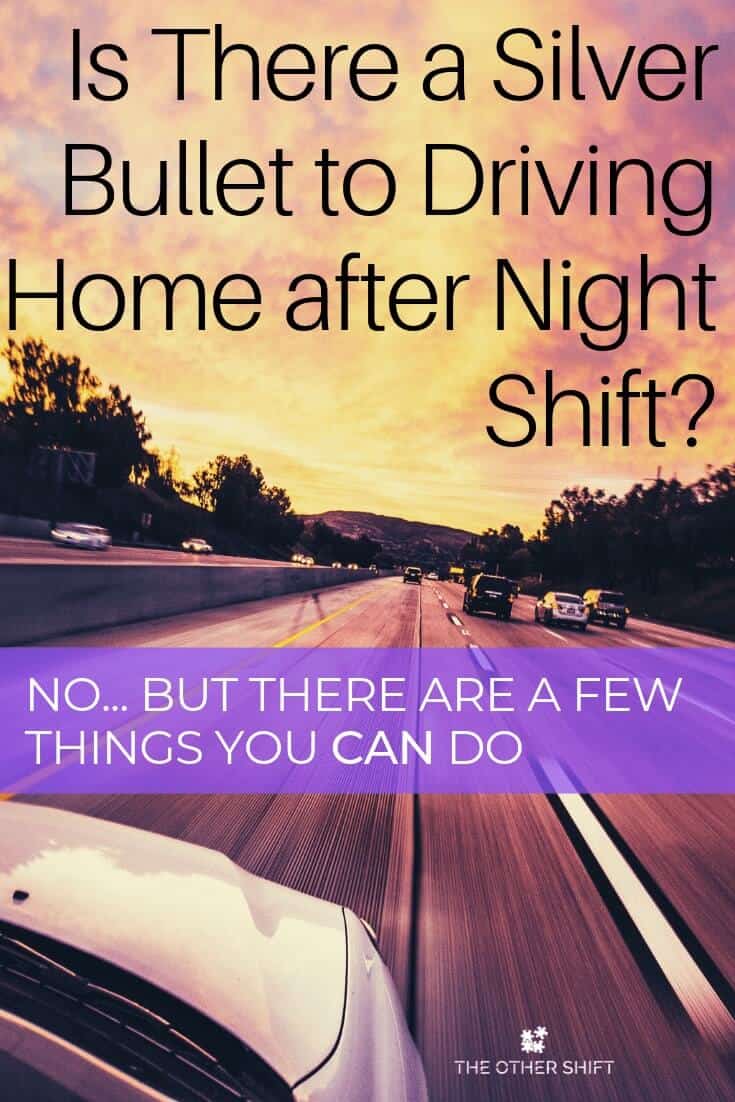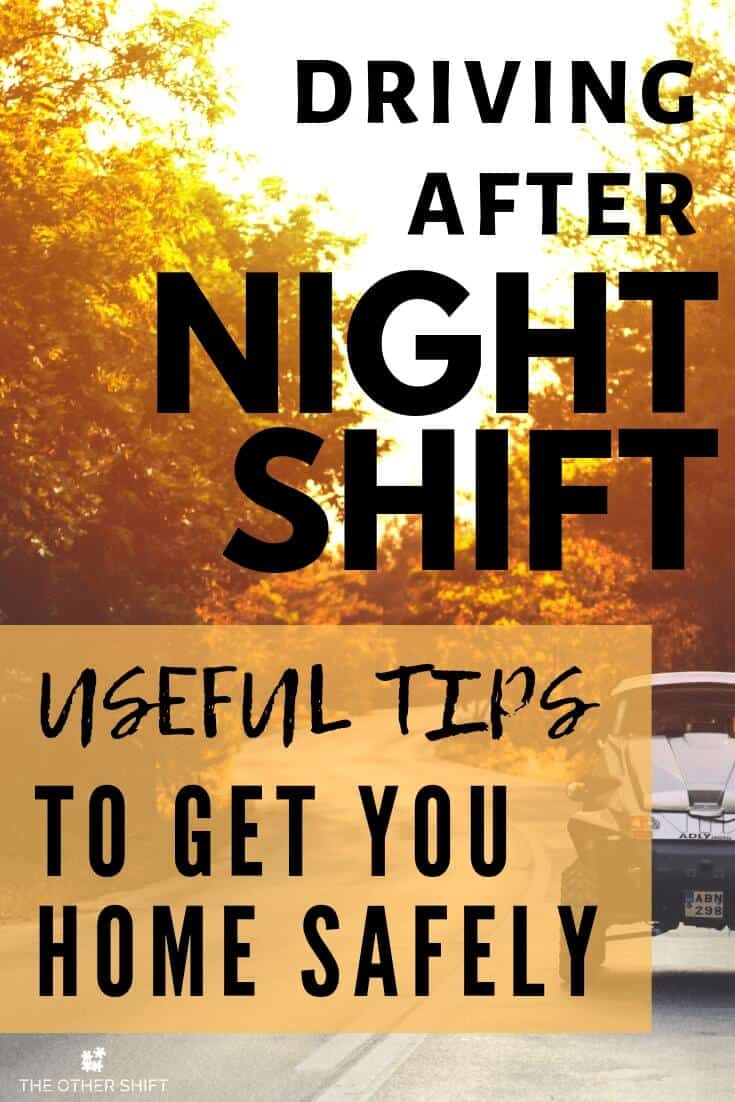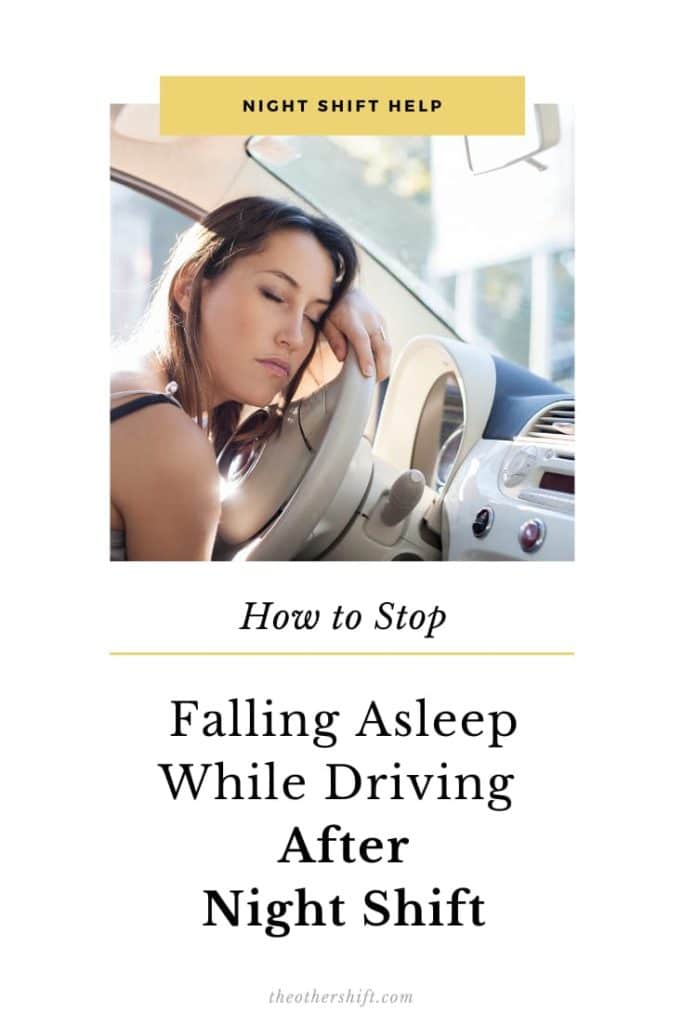Disclosure: This page may contain affiliate links, meaning we receive a commission if you decide to make a purchase through our links, but this is at no additional cost to you. Please read our disclosure and privacy statement for more info.
I’m sure getting into the driver’s seat after working a night shift shouldn’t feel like this… scary, nerve-racking and downright dangerous. Unfortunately, driving “tricks” to stay alert are not very effective, as I have found out, so what else can we do to get home safely after working the 3rd shift?
Unfortunately, there is no silver bullet to staying awake when driving after nights besides actually sleeping. But enjoying a coffee nap, carpooling, using the bathroom before you drive, skipping the morning drinks and listening to something interesting can improve awareness and help you stay alert while driving.
Too many times I have driven home white-knuckled, leaning forward with all the windows down trying to win the sleep fatigue battle. But there has got to be a better way. Let’s discover what this is.
If you’d prefer to watch rather than read, this video sums up the blog post nicely.
Night Shift Driving “Tricks” – Are They Effective?
I hate to break this to you, but no, they won’t. Well, at least not for a sustained period of time anyway.
As an Emergency nurse on a rotating roster, working a crazy combination of days, swing and nights shifts, I know the feeling all too well of being downright terrified behind the wheel of a car.
No, not because my driving is below average as Dan would joke about, which it isn’t by the way, but because I am utterly and completely stuffed.
My feet hurt, my brain is dead and physically I just, can’t.
I seem to always give myself excuses for the 45 + minute commute home that driving is the BEST way to be in bed the quickest, but is it necessarily the safest? Definitely not.
Most of us, except for a few lucky ducks I read about online, don’t have the luxury of having a work minibus or taxi service paid for by our employer to get home or even a place we can sleep for a while after finishing.
So we are often forced to take matters into our own hands and do the best we can when traveling home.
“Being awake for 18 hours straight makes you drive like you have a blood alcohol level of .05.”
Source: (1)
Here is a list of “tricks” which I have tested and tried over the last 10+ years of nursing, that I’m honestly sad to say, none of which really worked for a sustainable time.
- Listening to the heaviest, rock, rap, punk, or whatever sort of annoying music I can find as loud as it can possibly go without blowing the speakers.
- Eat. Eat. Eat. All the way home.
- Wind down ALL the windows so you have to concentrate hard, even on breathing. Your hair is flying madly in your face, eyes and mouth making this a constant distraction and a full-time job to maintain for the drive home. *Note this leaves one hand on the wheel which is less than ideal.
- If it’s raining (and you can’t have the windows down) turn up the aircon full blast. Making the inside of your car feel like an uncomfortable igloo.
- Drinking coffee – Despite being a very popular choice, it is a short term fix when driving after night shift and will play havoc when trying to sleep when you get home. We talk more about coffee in the next section and how we can use it to our advantage.
According to the U.S. National Highway Traffic Safety Administration. “Drowsy driving kills — it claimed 795 lives in 2017”.
(source)
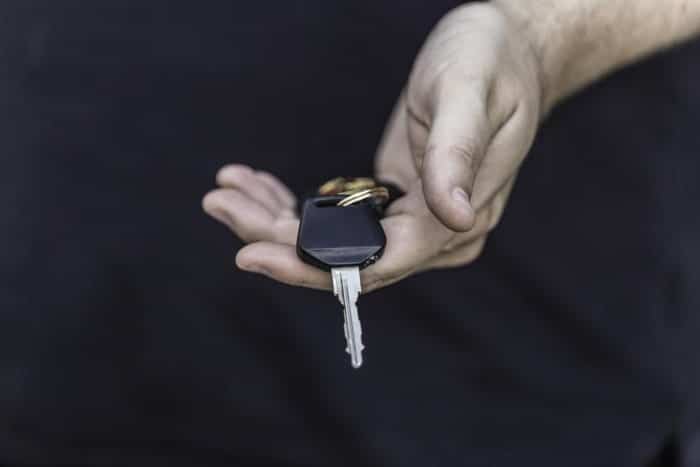
Is Sleep the Only Answer to Driving Home Safely After Night Shift?
Yeah. It seems so.
I don’t say this to be the fun police, but the honest truth is I don’t want you to become another statistic. Another accident caused by somebody falling asleep while driving. I just can’t watch another news story like this.
“Getting adequate sleep on a daily basis is the only true way to protect yourself against the risks of driving when you’re drowsy.” Source: (3)
So. I want to give you a set of questions you need to ask yourself before and also during your trip home which will tell you if you’re too tired to drive.
Here we go.
- Have you yawned more times then you can count between finishing work and getting to your car?
- Are you switching between lanes without meaning too? This is called “lane deviation” by the researches in this area.
- Can you remember the last couple of exits or even getting into the car to start with?
- Have you entered the “rumble strip” just off the road even once?
If you’re nodding your head to any of these questions, it’s time to pull over in a safe spot, set your alarm for 20-30 minutes and sleep.
Insider Tip:
Bring an eye mask in the car and even a blanket and pillow to make “pulling over” to sleep for 20-30 minutes easy to undertake.
Read: Top Selling Eye Masks for Sleeping That Mean Total Darkness
But What About Coffee and Driving Home After Night Shift?
As I mentioned, despite being popular it’s not always effective for the long term. However… research has shown that drinking coffee, specifically, an espresso shot or a double shot, then sleeping for 20 minutes has proven to make you feel more alert.
It’s called a “coffee nap.”
Despite not being a coffee drinker I was incredibly interested in how this could help, so I wrote an entire post about it which you can check out here.
The bottom line here is, if you start to merge lanes and or run up the gutter, pull over at the nearest coffee hut or take out spot, down an espresso then park in a safe place well off the road and have a 20-minute nap.
Set your phone alarm if you’re scared of sleeping there all day, as I commonly am. It can work beautifully despite how strange it sounds.
If you don’t drink coffee but STILL want to drive home… read on my friend.

What If I Still Want to Push Through and Drive After Night Shift?
I thought you might ask this because I have before.
Here are a few tips which I have used to get home safely. But I do want to tell you these are not perfect and will NEVER replace sleep.
Visit the Bathroom Before You Drive Home
This may seem obvious but in your rush to get into bed, going to be the bathroom seems like an afterthought.
Driving home with a full bladder can be as distracting as being drunk while driving. Needing to hold your bladder can decrease your attention span and negatively effect your memory. (Source)
Consider Public Transport
Getting home as quickly as possible makes this option look much less desirable. I get it. The frequent stops drives you bonkers.
BUT it could be worth looking into.
I found out, after a year of doing night shift, that a public bus literally went straight past my house and dropped me 20 feet from the hospital doors.
I stopped driving to work… immediately!
After a quick google search, you will find the local bus and train timetable to suit your schedule and where you live. It’s totally worth it.
Call Somebody (On Hands-Free)
This method actually worked pretty well for me and was a great time to talk and bond with husband Dan, the co-founder of this website, when he was also commuting to work. (You can read more about us and the reasons behind starting a shift work website here).
If Dan was busy or already at work I would call the next most excitable person I know who would be free and have that conversation fire me up.
For example, calling somebody whom you just worked with is a great way to make sure both of you get home safely. Debrief about the shift and continue to talk until both of you are home safe and sound.
Use Siri or voice-activated services on your phone to dial your friends. Don’t risk looking at your phone to find their number, it’s not worth it.
[VIDEO] – Despite being a news article it’s actually pretty interesting about drowsy driving. Take a look if you’ve got a spare minute.
Carpool Where Possible
I know you may have heard this suggestion, but have you actually asked around your workplace to see who lives around your area or drives past your house on the way to work?
I know this question may seem weird to randomly put out there, particularly if you’re new to a workplace, but I bet there is somebody else thinking it.
Nobody and I mean nobody, is immune to this awful feeling when driving after a night shift.
Did You Know?
Most MVA (Motor Vehicle Accidents) occur when there is only one person in the car and there are no passengers.Source: (5)
Go and investigate to see if your workplace has some kind of social page on Facebook, WhatsApp or another social community page and see what you can find.
Personally, our social page is FULL of the most random stuff and people really wouldn’t mind at all you asking the question. You may even cause a great discussion around the subject which will benefit everyone.
I would also take the time to really listen during conversation and take note where people live.
Once you’ve worked out if they live close to you, offer to drive them home. Eventually, they will feel guilty and offer to drive you home too. This works amazingly!
As a rotating shift worker I know it can be challenging when you have a really awesome set up with somebody, then your roster changes and you’re back at square one again.
So create a carpool army!
Organize a bunch of your friends together so you always have somebody to rely on.
If you are the one driving stick to the slow lane and travel under the speed limit and avoid those frequent lane changes.
If you are the passenger – don’t fall to sleep! The whole point of this is to support each other. You would want the same situation when you’re behind the wheel. Chat, laugh, sing, make a fool of yourself to keep this commute light and entertaining.
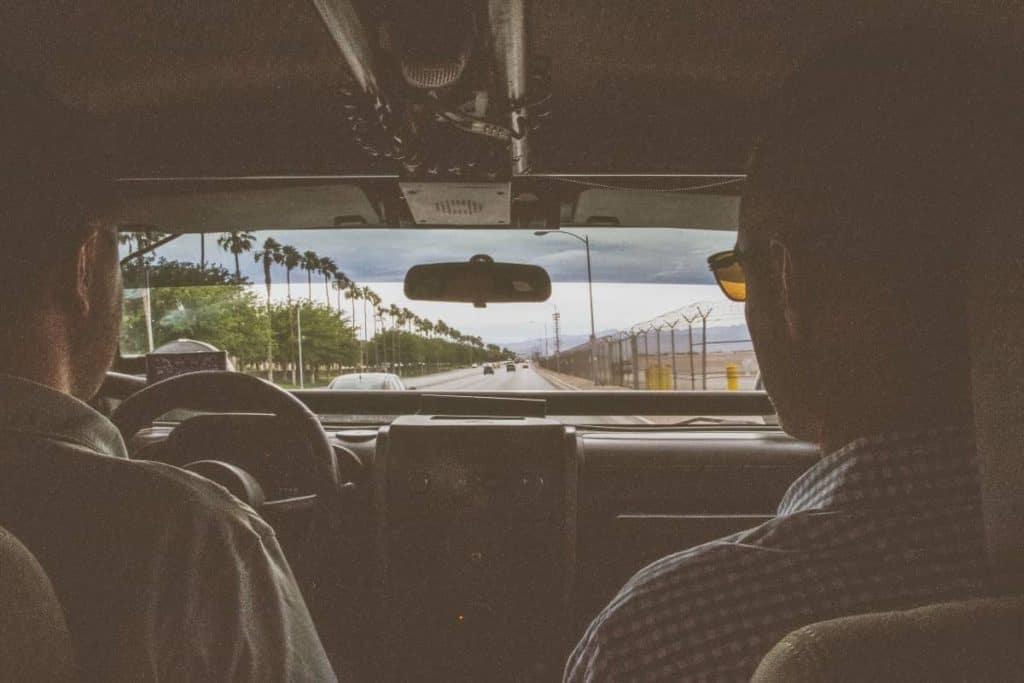
Listen to an Interesting Podcast
This method is similar to the music “trick” we discussed earlier but I find it to be more intriguing and less annoying. I tend to become immersed in the information instead of wanting to switch it off.
TED talks are a really great way to pass the time.
On our Pinterest account, we have an entire board dedicated to TED talks we love. You can check them out here and start following our account if you like what we do and want more of it.
Another great podcast which is very popular in the US is Lauren Conrad: Asking for a Friend. In Australia (where we are from), Serial, Mamamia Out Loud and Dirty John are goers.
Just take a look at the “browse” section of the Itunes app and see what’s popular.
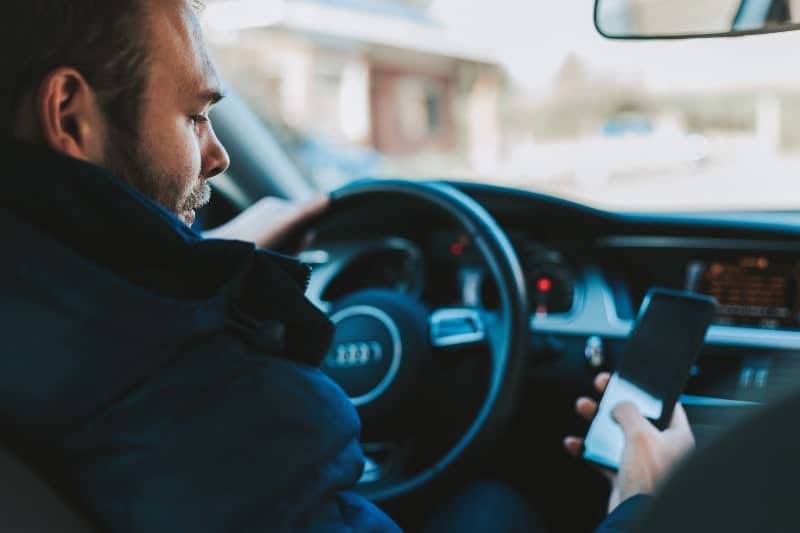
Get Stuck Into an Audiobook
While I’m in the mood to recommend audio tools, listening to a story may seem amateur, but it can work to keep you distracted from how tired you really are.
If you read books on your phone, tablet or kindles, some devices will allow you to switch to a playback option or speaker option where it can read the works aloud. Another option is to simply download a story and play it through the car speaker.
I don’t recommend wearing earbuds or playing these stories or music through headphones because it makes you less aware of your environment and situation on the road as you cannot hear noises or sounds allowing you to make a quick decision.
These are a few of the best audiobooks of all time which I obtained through this website.
- Hidden Figures
- Ready Player One by Ernest Cline
- Elon Musk by Ashlee Vance
- Beneath a Scarlet Sky by Mark Sullivan
- Wear sunglasses
Limit the temptation to want to close your eyes because the sun is piercing your eyeballs.
Watching the sunrise after we finished nights can be a really lovely sight but it can also feel like the devil.
Slide on some shades my friends and make it a priority to check they are in the car before you leave home for the previous shift.
We cannot recommend blue light blocking glasses enough when you get home to help your sleep hormones adjust, but on the way home you might need something a little stronger and specific for sun protection.
If you are interested in learning more about blue light, here are two posts you will find really worth your while as a shift worker:
- How Swanwick’s Blue Light Blocking Glasses Put Me To Sleep
- Do Night Shift Workers Need Blue Light Blocking Glasses?
Success Tip:
Wearing blue light blocking glasses can really speed up the process to allow your body to sleep. They allow you to still use your device or play video games and still sleep soundly by allowing your sleep hormones to do their job properly.
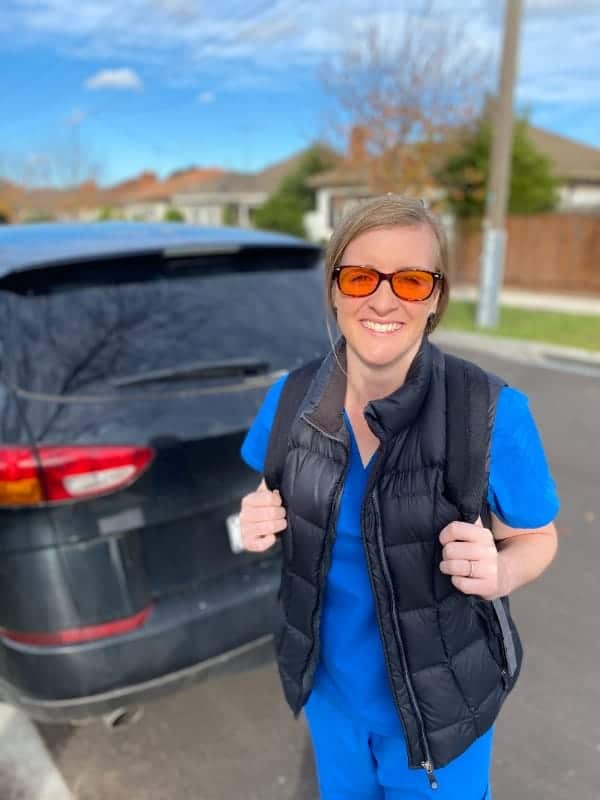
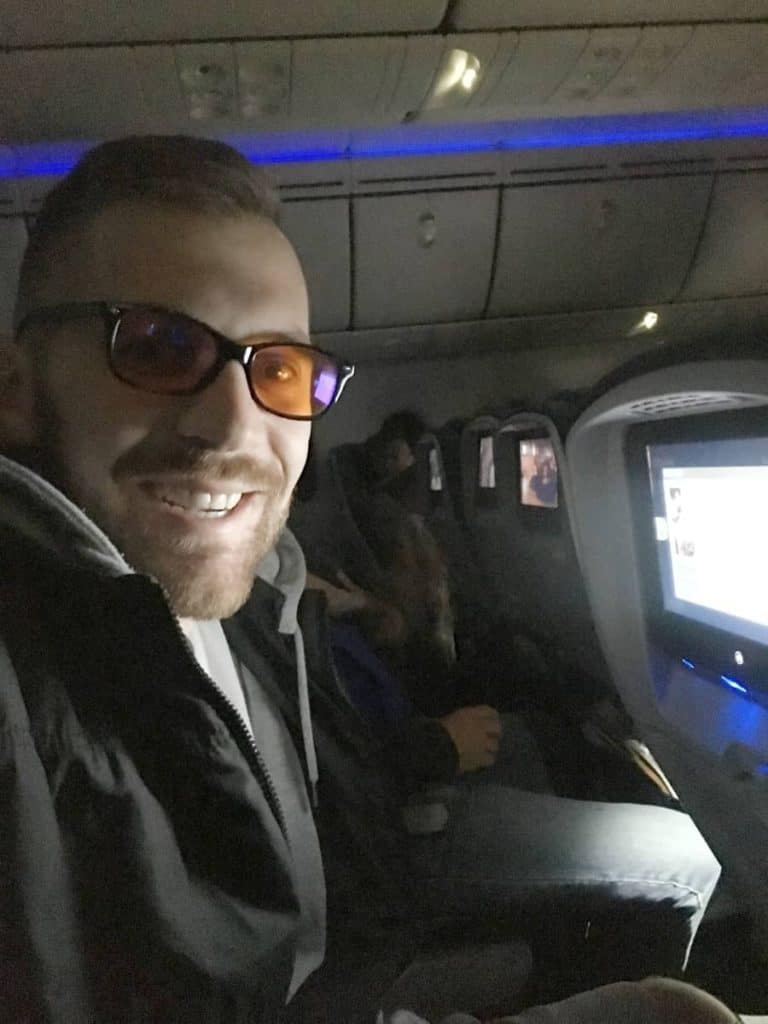
Skip After Work Morning Beers
For those who drink alcohol, I’m sure I don’t need to tell you it can make you feel a little sleepy.
Saying no to the group of energic night shift workers heading off to the pub for morning happy hour doesn’t make you a prude.
There is plenty of time for after work drinks when working a morning/1st shift or even after working the second shift.
If you want to read more about what alcohol does to us after a night shift and what impact this has on our bodies and sleep, take a look at a previous blog post we published here. It’s fascinating and I learned a few valuable lessons through writing it.
Check Your Prescription Medications
Do your legs ache after working a long night shift? Do you sometimes need to take the edge off by popping and few pills to relieve the pain?
Just be careful what you take before you drive as some can cause drowsiness, adding to fatigue you are already feeling.
If your legs do ache we have explored some techniques you can do at home to take the pain away here.
However, if these pills are essential and you do need to take them at a particular time, really consider the carpool option we gave earlier, get somebody to pick you up or jump on public transport.
Related: My Top Tip for Taking Melatonin on Night Shift: Plus 10 More
Insider Tip: Empty your pockets
For the nurses reading this, how many times have you physically removed the scissors from your scrub pocket before driving home? There have been reports of minor car accidents made seriously worse by items found in people pockets. Hot tip – Remove pens, tape measures, office supplies and even your phone from your pocket, before you start to drive
Resources to Sleeping Well on Night Shift
I couldn’t help but recommend my new favorite book, “Too Tired To Cook.” It’s written by a seasoned shift worker and Clinical Nutritionalist and is packed with helpful tips and advice to make us all healthier shift workers.
I got mine from Amazon and it arrived within a day or two and I can’t put it down. Get yours here. #ad
Related Posts
We have spoken heavily about sleep being the only true option to conquer fatigue behind the wheel. But are you getting enough sleep before the shift?
Sleeping on night shift is one of the BIGGEST topics we cover on the website and I wanted to give you a few helpful blog posts we have previously written to help you get the recommended 7-9 hours sleep.
| Sleep Topic | Blog post title |
|---|---|
| Sleep Aids | 10 Must-Have Night Shift Sleep Aids for a Heavenly Sleep |
| Night Shift Glasses | How Swanwick’s Blue Light Blocking Glasses Put Me To Sleep |
| Sleep Music | Sleep Music Facts, Playlists And Songs For Insomnia Sufferers |
| Book Lights | 5 Best Reading Book Lights That Will Help You Sleep |
| Sleeping when you’re not tired | How to Fall Asleep Quickly Even When You’re Not Tired |
Summary: How to Stop Falling Asleep While Driving After Night Shift
Unfortunately, there is no silver bullet to staying awake when driving after nights. However, we hope you found a few useful tips to try after your next night shift to drive home safely.
What else do you do? Let us know in the comments below.
Cheers,

Disclosure: This page may contain affiliate links, meaning we receive a commission if you decide to make a purchase through our links, but this is at no additional cost to you. Please read our disclosure and privacy statement for more info.

